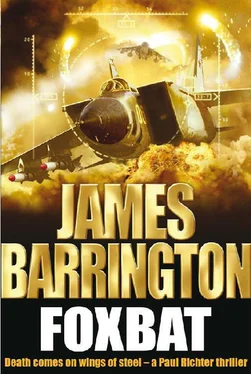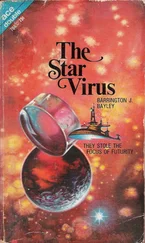MiG-25 Foxbat, callsign Zero Six, over Chiha-ri, North Korea
‘Zero Six, Chunghwa. Eight high-speed contacts approaching from bearing zero eight zero. Range twenty miles, low level. Possibly American. Combat Group Two is heading to intercept, present range fifty-three miles.’
‘Acknowledged. Zero Six will deal with the aircraft attacking Chihari. Remainder of the Combat Group, break off immediately and engage the Americans.’
Malakov glanced to his left and saw the other MiG-25s turning and accelerating away from him. That made the contest more even: he could handle the two Harriers himself, once he found them.
And then he saw two fast-moving contacts on his radar, about five miles ahead. Obviously the attacking aircraft were so low that they’d been lost in the ground clutter, or behind some of the surrounding hills.
But now he had them.
Chiha-ri missile base, North Korea
In the command bunker, the countdown for the first of the remaining two Scuds was down to the last couple of seconds, and the missile was still standing unscathed on the TEL. The commanding officer alternated his gaze between the digital clock that showed the countdown progress and the view of the missile through the window.
As the clock reached zero, he saw what he’d been fearing: one of the attacking aircraft was sweeping in from the north, heading directly towards the launch pad.
Then two things happened simultaneously. The missile’s engine ignited with a roar, and the Scud lifted smoothly off the launcher and accelerated into the sky. And a ripple of flame appeared below the right-hand wing of the grey-painted swept-wing aircraft. An instant later several rockets smashed into the now-redundant TEL and the concrete launch pad, but none touched the Scud.
Cobra Two, over Chiha-ri, North Korea
In his GR9, Richter knew the moment he fired the CRV7s that he was too late. Even as the rockets streaked towards the launch pad, he could see the Scud climbing away. They’d failed to stop the launch – or more accurately, he had failed to stop the launch when he missed the second Scud with his Maverick. If that missile had hit, he’d have fired his CRV7s at least one minute earlier, when the Scud was still sitting in its TEL.
His remaining Sidewinder was of no use against the missile, because it almost certainly wouldn’t be fast enough to catch it: he guessed the Scud was already about three thousand feet off the ground, probably travelling at close to Mach 2 and still accelerating. The ‘winder had a maximum speed of Mach 2.5, and a fairly short range. The mathematics of an intercept were compelling and unarguable.
There was, he assessed, just one thing he could do that might work. It was a hell of a risk, but it was the only possible way he could think of that might bring down the Scud. He glanced to the north, but could only see one incoming Foxbat. Presumably the others had spread out or climbed to high level. But one should be enough.
He opened the throttle fully and pulled the Harrier into a high-speed climb.
MiG-25 Foxbat, callsign Zero Six, over Chiha-ri, North Korea
Gennadi Malakov checked his instruments and ensured that the first of his four R-40T infrared-homing missiles had locked on to the British aircraft that was now climbing steeply above the Chiha-ri launch site.
‘Excellent,’ he murmured, and released the weapon. Then he turned his attention back to the Saphir radar, looking for the second target. This really was just too easy.
Cobra Two, over Chiha-ri, North Korea
‘Paul! Get to low level. You’ve an Acrid heading straight for you.’ ‘Copied,’ Richter responded, concentrating on following the Scud in its climb. ‘It’s behind me so I can’t see it. Can you call ranges.’
‘For fuck’s sake, you can’t outrun it. It’s a Mach four missile.’
‘I’m not going to try. Just call when it’s about a mile behind me.’
Cobra One, over Chiha-ri, North Korea
Dick Long suddenly guessed what Richter might be intending. He turned his aircraft so that he could see his wingman more clearly and, more crucially, track the massive Acrid missile that was closing on the Harrier at over four times the speed of sound.
Long just hoped Richter knew what he was doing.
Chiha-ri missile base, North Korea
In the Chiha-ri command bunker, the digital countdown for the last Scud passed five seconds to go, and the missile was still untouched on the pad. Two out of six launches wouldn’t please Pyongyang, the commanding officer knew, but in the circumstances it was a far better result than he had realistically expected. He looked out of the armoured window towards the TEL and nodded in satisfaction as, with a roar and sudden burst of flame, the last Scud leapt away from the launcher.
Cobra One, over Chiha-ri, North Korea
‘Estimate two miles, Paul. Standby. Oh, shit. The last Scud’s just been launched.’
‘Copied.’
‘Stand by for one mile point. Five, four, three, two, one. One mile now, now, now. Get the fuck out of there.’
Monday
MiG-25 Foxbat, callsign Zero Six, over Chiha-ri, North Korea
Gennadi Malakov’s attention was directed almost entirely towards locating and obtaining a missile lock on the second Harrier. He was confident that his R-40T would destroy the first aircraft within seconds, as the idiot Englishman was actually making it easier for the infrared-guided missile to kill him, because he was climbing almost straight up. If he’d dived down to low level there would have been a chance, albeit a small one, that he could have got away.
Then he spotted his second target. The Harrier was in a gentle climb on the far side of the missile base. Malakov pointed his MiG-25 directly towards it, selected his second R-40T and waited for the seeker head to lock on.
Chiha-ri missile base, North Korea
Only after the last Scud had lifted off its TEL did the commanding officer finally answer the direct line from Chunghwa.
‘We’ve launched two missiles,’ he reported, ‘but the attacking aircraft destroyed the other four.’
The brief silence from the Air Command headquarters spoke volumes. ‘We will discuss your failure to obey the simplest of orders later, Colonel. Now, order your anti-aircraft guns and missile batteries to cease firing. We are sending in fighters to locate and destroy the British intruders.’
Cobra Two, over Chiha-ri, North Korea
Richter had done a very rough calculation in his head. If the Acrid was travelling at Mach 4, that meant it was covering over half a mile every second. So from the one-mile distance, and with the Harrier flying at around four hundred miles an hour, the missile would hit him between two and three seconds later. It was, he knew, going to be very tight.
He waited for a quick count of two after Dick Long’s call, then acted. He slammed the nozzles into the fully-downward landing position, then chopped the throttle back. It felt as if he’d been kicked in the arse by an angry elephant, and the grey haze of g-loc swam in front of his eyes for a second or two before the ‘speed jeans’ began squeezing the blood back up towards his brain.
The effect on the Harrier was immediate. The aircraft had been climbing almost vertically: the change in nozzle angle stopped the climb and kicked the aircraft onto its back. When Richter cut the power, the GR9 completed the loop and began falling nose-first back towards the ground.
Читать дальше












